GUEST EDITOR
Jame Abraham, MD, FACP
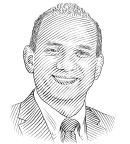
Dr. Abraham is the Director of the Breast Oncology Program at Taussig Cancer Institute, and Professor of Medicine, Lerner College of Medicine, Cleveland Clinic.
For this installment of the Living a Full Life series of articles, guest editor Jame Abraham, MD, spoke with ASCO President-Elect Lori Pierce, MD, FASTRO, FASCO. A radiation oncologist, Dr. Pierce is Professor and Vice Provost for Academic and Faculty Affairs at the University of Michigan as well as Director of the Michigan Radiation Oncology Quality Consortium.
LORI PIERCE, MD, FASTRO, FASCO
Why radiology? “I broke a bone or two when I was a child and had to have some x-rays. I was completely fascinated by the process and the doctors involved. That’s when I decided I wanted to become a radiologist.”
On the future of radiation oncology: “We’re at an exciting juncture in radiation oncology. I have no doubt that incorporating tumor biology into our manage-ment plan will give us the opportunity to further increase the personalization of radiotherapy.”
Advice for aspiring oncologists: “My singular advice to young doctors is to reflect back now and then to the day they recited the Hippocratic oath. It puts everything in perspective.”
The 2019–2020 ASCO President-Elect Lori Pierce, MD, FASTRO, FASCO, is originally from Washington, DC, but her family moved to Philadelphia when she was in the 9th grade. As a child, Dr. Pierce spent many of her summer vacation months in Ahoskie, a small town in North Carolina’s Inner Banks region, where her father was born and reared.
“At that time in the South, segregation was deeply ingrained in the culture, and I saw and experienced things that definitely shaped my world view and career path,” remembered Dr. Pierce. “Due to circumstances beyond their control, neither of my parents had the opportunity to go to college, so they instilled a high priority on education in our family. I had a terrific educational experience in public schools. I graduated from a high school in Philadelphia that was considered a college preparatory school. So, by the time I entered college, I was academically grounded.”
Dr. Weaver and Some Broken Bones
Asked whether there were any early influences or events that might have sparked an interest in medicine, Dr. Pierce recalled a family doctor’s determined and compassionate care during her childhood summers in North Carolina. “Although he was a solo practitioner, Dr. Weaver was always there when people needed him. I was so impressed by his ability to do it all and the special place in our society he occupied. It stuck with me.”
She continued: “I was a small kid, but I didn’t let that inhibit me from taking chances. I broke a bone or two in the process and had to have some x-rays. I was completely fascinated by the process and the radiologists involved in doing the x-rays. I asked so many questions, and they answered each one, which only increased my curiosity. That’s when I decided that not only did I want to go into medicine, I wanted to become a radiologist. Moreover, I was an honors student in math and science, so I figured radiology was a good fit.”
Help From a Mentor
After high school, Dr. Pierce attended the University of Pennsylvania, graduating in 1979 with a degree in biomedical engineering. She was accepted to Duke University Medical School, where she intended to pursue her goal and become a radiologist. At Duke, medical students did their basic science in the first year and their core rotations in the sophomore year. The third year was research, and the majority of the fourth year was spent in the clinic.
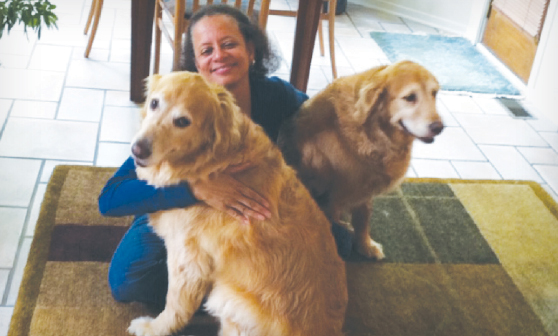
Dr. Pierce with her beloved Golden Retrievers Jordan and Jenna
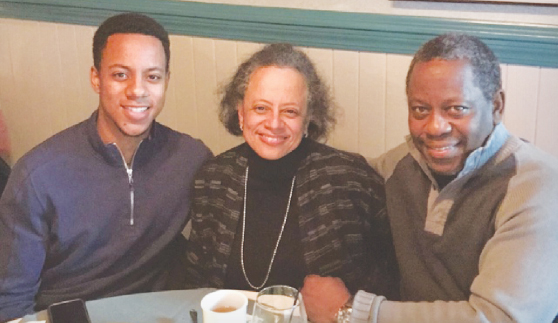
Dr. Pierce with her son, Evan, and her husband, Tony Denton
When Dr. Pierce met her advisor in her third year at Duke, she learned about research options. “The one that looked most interesting to me was in radiation oncology,” she explained. “I also had a bit of luck in that Duke had recently recruited Dr. Leonard Prosnitz from Yale to chair the school’s first radiation oncology department. Dr. Prosnitz became an incredible mentor. Radiation oncology gave me the opportunity to combine x-rays with cancer biology, which I found incredibly intriguing. The best part, however, was interacting with patients with cancer, getting to know them as they were undergoing treatment. I fell in love with radiation oncology and never looked back.”
Finding a Specialty
After completing a radiation oncology residency and chief residency at the Hospital of the University of Pennsylvania, Dr. Pierce was appointed Senior Investigator at the National Cancer Institute, National Institutes of Health in Bethesda, Maryland. It was during her residency that she made the decision to specialize in breast cancer.
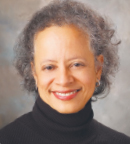
Lori Pierce, MD, FASTRO, FASCO
“Penn was a competitive environment and it had a world-class breast cancer program. I learned about breast-conserving surgery and radiation therapy, which was a relatively new and exciting approach. I also had great patient interaction in the clinic, which had a profound impact on my career,” she said.
In 1992, Dr. Pierce joined the faculty of the University of Michigan. Since coming to Michigan, she has served as Residency Director and Clinical Director in the Department of Radiation Oncology. In August 2005, Dr. Pierce was appointed Vice Provost for Academic and Faculty Affairs by the University of Michigan Board of Regents.
A Bright Future for Radiation Oncology
Dr. Abraham asked Dr. Pierce to share her thoughts on the future of radiation oncology from the arc of her career. “Moving from the one-size-fits-all approach in radiation oncology to a personalized medicine approach was a huge leap forward in the discipline. And the future looks promising. I have no doubt that incorporating tumor biology into our management plan will give us the opportunity to further increase the personalization of radiotherapy. This will likely not only increase tumor control rates and survival outcomes, but will also help to minimize toxicity from treatment. Moreover, this trajectory will allow us to determine which patient needs treatment intensification and which patient requires treatment de-intensification. So, we’re at an exciting juncture in radiation oncology, and I’m thrilled to be part of it.”
Private Practice vs Academia
Asked about her decision to become an academic oncologist, Dr. Pierce replied that she never thought about going into private practice. “I have the utmost respect for my colleagues in the community. They do great and important work. But I get excited by exploringnew things, pushing the envelope. I enjoyed working in the lab early in my educational journey, and an academic institution gives me the best of all worlds: patient care, research, and teaching.”
Racial Disparities: Biology and Policy
During her residency at the University of Pennsylvania, Dr. Pierce wrote a seminal paper on radiation and breast-conserving surgery in African American women compared with their white counterparts. She told Dr. Abraham that she wasn’t looking to show a difference but instead a similarity in outcome, which would demonstrate that African American women with early-stage disease should routinely be offered breast-conserving therapy.
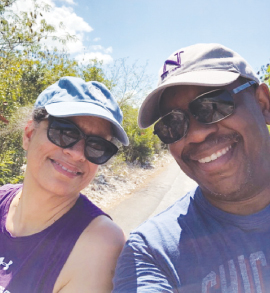
Dr. Pierce with her husband, Tony Denton, on vacation in Turks and Caicos
“We found that tumor control in the breast among white and African American women was no different. But we also found the distant recurrence and survival rates were worse for women of color. This was in the era before triple-negative breast cancer andclinical subtypes of breast cancer were identified. And it has subsequently been shown that the increased incidence of triple-negative breast cancer among African American women is one reason for the poorer outcomes.”
Dr. Pierce continued: “That said, there are multiple disparity issues of access to screening and timely care that affect the overall outcomes of African American women with breast cancer. The key factor in this issue is that breast cancer cells do not know what color we are. We need to break down the barriers to care so that all women with breast cancer have a fighting chance to conquer the disease. Understanding biology is vital, but it should not cloud the policy issue of the importance of equitable access to care.”
ASCO Presidency
Although her mission for her upcoming ASCO presidency is multifocal, Dr. Pierce is particularly enthusiastic about the Society’s global outreach programs. “ASCO plans to launch global outreach programs in a culturally sensitive manner. There will be regional counsels throughout areas of the world, so we can partner with local oncology leaders and understand their care models; through this exchange of information, hopefully we can help to improve patient care.”
Understanding biology is vital, but it should not cloud the policy issue of the importance of equitable access to care.— Lori Pierce, MD, FASTRO, FASCO
Tweet this quote
Dr. Pierce is very interested in learning about the best care models for low- to middle-income countries, which can be translated back to the United States. “Population-based care is challenged here, too,” she added. “I view global outreach as a bidirectional learning experience that can also enhance our own way of thinking.”
She continued: “Another key interest of mine is prevention and better, more cost-effective use of our health-care resources. We can’t change people’s incomes, but we can focus on educating the public about the importance of healthy lifestyles and the choices they make. An area that ASCO is passionate about is determining how we can deploy all of our ASCO members in meaningful ways to emphasize cancer prevention and level the playing field for all Americans.”
Advice for Aspiring Oncologists
Dr. Pierce shared her thoughts for young people aspiring to become oncologists. “In my role as Vice Provost for Academic and Faculty Affairs, I participate in the medical school graduation. At the end of each ceremony, all the graduates and current physicians stand and recite the Hippocratic oath. And it is a moving experience. We do what we do because we dedicate our lives to caring for our patients. And to do that, we need to have the utmost respect for human life. Oncology is a vastly rewarding field, but it is also hugely demanding. My singular advice to young doctors is to reflect back now and then to the day they recited the Hippocratic oath. It puts everything in perspective.”
Personal Balance
Dr. Abraham closed by asking how the incoming ASCO President finds balance in her own life. “I have a great husband and son. We’re all super busy, but in our free time, we just enjoy hanging out together, with our dogs of course. We love sports and traveling, but most of all we simply enjoy being a family. That’s the best balance you can find.” ■
DISCLOSURE: Dr. Pierce reported no conflicts of interest.
Living a Full Life: Let Us Hear From You
We encourage you to contact us if you would like to be interviewed about your own experiences and interests or would like to nominate a candidate. We are seeking to learn what motivates and inspires you and how you manage to achieve balance in your own life.
Write to editor@ASCOPost.com and reference Living a Full Life.

